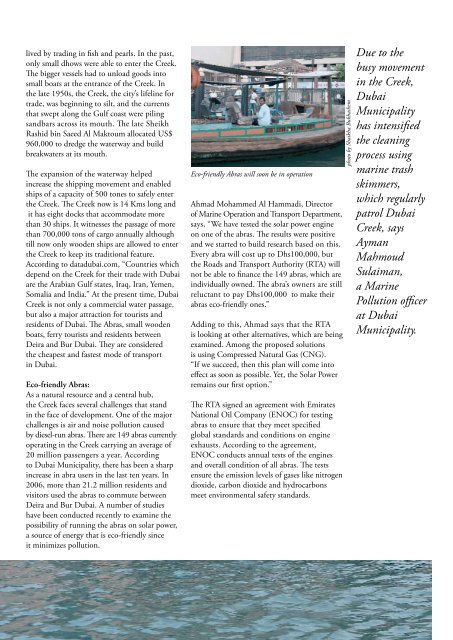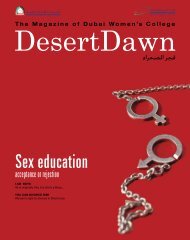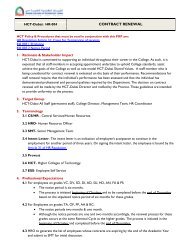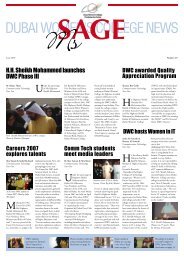The Magazine of Dubai Women's College Volume 16 Issue 2, May ...
The Magazine of Dubai Women's College Volume 16 Issue 2, May ...
The Magazine of Dubai Women's College Volume 16 Issue 2, May ...
Create successful ePaper yourself
Turn your PDF publications into a flip-book with our unique Google optimized e-Paper software.
lived by trading in fish and pearls. In the past,<br />
only small dhows were able to enter the Creek.<br />
<strong>The</strong> bigger vessels had to unload goods into<br />
small boats at the entrance <strong>of</strong> the Creek. In<br />
the late 1950s, the Creek, the city’s lifeline for<br />
trade, was beginning to silt, and the currents<br />
that swept along the Gulf coast were piling<br />
sandbars across its mouth. <strong>The</strong> late Sheikh<br />
Rashid bin Saeed Al Maktoum allocated US$<br />
960,000 to dredge the waterway and build<br />
breakwaters at its mouth.<br />
<strong>The</strong> expansion <strong>of</strong> the waterway helped<br />
increase the shipping movement and enabled<br />
ships <strong>of</strong> a capacity <strong>of</strong> 500 tones to safely enter<br />
the Creek. <strong>The</strong> Creek now is 14 Kms long and<br />
it has eight docks that accommodate more<br />
than 30 ships. It witnesses the passage <strong>of</strong> more<br />
than 700,000 tons <strong>of</strong> cargo annually although<br />
till now only wooden ships are allowed to enter<br />
the Creek to keep its traditional feature.<br />
According to datadubai.com, “Countries which<br />
depend on the Creek for their trade with <strong>Dubai</strong><br />
are the Arabian Gulf states, Iraq, Iran, Yemen,<br />
Somalia and India.” At the present time, <strong>Dubai</strong><br />
Creek is not only a commercial water passage,<br />
but also a major attraction for tourists and<br />
residents <strong>of</strong> <strong>Dubai</strong>. <strong>The</strong> Abras, small wooden<br />
boats, ferry tourists and residents between<br />
Deira and Bur <strong>Dubai</strong>. <strong>The</strong>y are considered<br />
the cheapest and fastest mode <strong>of</strong> transport<br />
in <strong>Dubai</strong>.<br />
Eco-friendly Abras:<br />
As a natural resource and a central hub,<br />
the Creek faces several challenges that stand<br />
in the face <strong>of</strong> development. One <strong>of</strong> the major<br />
challenges is air and noise pollution caused<br />
by diesel-run abras. <strong>The</strong>re are 149 abras currently<br />
operating in the Creek carrying an average <strong>of</strong><br />
20 million passengers a year. According<br />
to <strong>Dubai</strong> Municipality, there has been a sharp<br />
increase in abra users in the last ten years. In<br />
2006, more than 21.2 million residents and<br />
visitors used the abras to commute between<br />
Deira and Bur <strong>Dubai</strong>. A number <strong>of</strong> studies<br />
have been conducted recently to examine the<br />
possibility <strong>of</strong> running the abras on solar power,<br />
a source <strong>of</strong> energy that is eco-friendly since<br />
it minimizes pollution.<br />
Eco-friendly Abras will soon be in operation<br />
Ahmad Mohammed Al Hammadi, Director<br />
<strong>of</strong> Marine Operation and Transport Department,<br />
says, “We have tested the solar power engine<br />
on one <strong>of</strong> the abras. <strong>The</strong> results were positive<br />
and we started to build research based on this.<br />
Every abra will cost up to Dhs100,000, but<br />
the Roads and Transport Authority (RTA) will<br />
not be able to finance the 149 abras, which are<br />
individually owned. <strong>The</strong> abra’s owners are still<br />
reluctant to pay Dhs100,000 to make their<br />
abras eco-friendly ones.”<br />
Adding to this, Ahmad says that the RTA<br />
is looking at other alternatives, which are being<br />
examined. Among the proposed solutions<br />
is using Compressed Natural Gas (CNG).<br />
“If we succeed, then this plan will come into<br />
effect as soon as possible. Yet, the Solar Power<br />
remains our first option.”<br />
<strong>The</strong> RTA signed an agreement with Emirates<br />
National Oil Company (ENOC) for testing<br />
abras to ensure that they meet specified<br />
global standards and conditions on engine<br />
exhausts. According to the agreement,<br />
ENOC conducts annual tests <strong>of</strong> the engines<br />
and overall condition <strong>of</strong> all abras. <strong>The</strong> tests<br />
ensure the emission levels <strong>of</strong> gases like nitrogen<br />
dioxide, carbon dioxide and hydrocarbons<br />
meet environmental safety standards.<br />
photo by Shaikha Bukhashem<br />
Due to the<br />
busy movement<br />
in the Creek,<br />
<strong>Dubai</strong><br />
Municipality<br />
has intensified<br />
the cleaning<br />
process using<br />
marine trash<br />
skimmers,<br />
which regularly<br />
patrol <strong>Dubai</strong><br />
Creek, says<br />
Ayman<br />
Mahmoud<br />
Sulaiman,<br />
a Marine<br />
Pollution <strong>of</strong>ficer<br />
at <strong>Dubai</strong><br />
Municipality.


